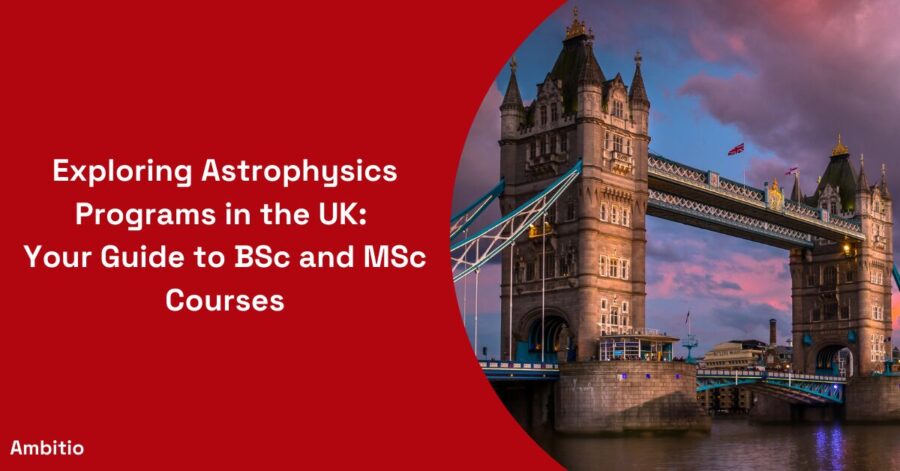14 December 2024
9 minutes read
Exploring Astrophysics Programs in the UK: Your Guide to BSc and MSc Courses

Are you passionate about astrophysics and dreaming of a career that lets you explore the mysteries of the cosmos? Pursuing a degree in astrophysics in the UK could be your first step towards understanding the universe’s deepest secrets. In this comprehensive guide, we will delve into astrophysics programs, entry requirements, and career opportunities in the United Kingdom.
Astrophysics in the UK
What is Astrophysics?
Astrophysics is a captivating branch of space science that seeks to unravel the fundamental principles governing the universe. It encompasses the study of galaxies, black holes, cosmic phenomena, and the nature of space and time. In the UK, astrophysics courses are offered at both undergraduate (BSc) and postgraduate (MSc) levels.
Astrophysics Courses in the UK
BSc in Astrophysics
An undergraduate astrophysics course (BSc) typically spans three years and covers a wide range of topics, including astronomy, cosmology, and theoretical physics. Several universities across the UK offer BSc programs in astrophysics, providing students with a solid foundation in this captivating field.
What to Expect in a BSc Astrophysics Program
In a BSc astrophysics program, you can expect to explore:
- Astronomical Observation: You’ll learn the art of observing celestial objects using telescopes and other instruments.
- Galactic Dynamics: Delve into the study of galaxy formation, evolution, and clusters.
- High-Energy Astrophysics: Explore the universe’s most energetic phenomena, including black holes and quasars.
- Theoretical Foundations: Develop a strong theoretical understanding of relativity, quantum mechanics, and more.
MSc in Astrophysics
For those seeking a more profound exploration of astrophysics, an MSc program is an excellent choice. These one-year postgraduate courses delve into advanced topics such as high-energy astrophysics, relativity, and galactic dynamics. The University of London is among the institutions known for offering top-tier MSc programs in astrophysics.
Specializations in MSc Astrophysics
In MSc astrophysics programs, you can often choose specializations, including:
- Cosmology: Investigate the large-scale structure and evolution of the universe.
- Astrophysical Research: Engage in cutting-edge research projects alongside renowned astrophysicists.
- Space Science: Explore the broader field of space science, including planetary science and astrobiology.
Universities Offering Astrophysics Programs in the UK
| University | Program | Course Highlights | Specializations |
|---|---|---|---|
| University of London | BSc & MSc in Astrophysics at UoL | – Astronomical Observations – Cosmic Phenomena – Quantum Mechanics – Astrophysical Research | – Cosmology – Astrophysical Research – Space Science |
| University of Oxford | Prestigious Astrophysics Programs | – Theoretical Astrophysics – Cutting-Edge Research | N/A |
| University of Cambridge | Leading Research in Astrophysics | – BSc Astrophysics – Graduate Studies | N/A |
| University of Edinburgh | Astrophysics and Cosmology | – Research Opportunities – Access to Observatories | N/A |
Entry Requirements for Astrophysics Programs
Typical Entry Requirements
Entry requirements for astrophysics programs vary among universities, but some common criteria include:
- Academic Qualifications: Most BSc programs require A-levels or equivalent qualifications in physics and mathematics. MSc programs usually demand a relevant bachelor’s degree.
- English Language Proficiency: International students must demonstrate proficiency in English, typically through exams like IELTS or TOEFL.
- UCAS Application: Prospective undergraduates need to apply through the UCAS (Universities and Colleges Admissions Service) system.
- Qualification and Course Type: Entry requirements may vary based on the specific university and the type of astrophysics course you’re interested in.
English Language Requirements
Several English language tests are widely accepted by UK universities. The two most commonly recognized tests are:
- IELTS (International English Language Testing System): IELTS is one of the most popular English language proficiency tests worldwide. It assesses your listening, reading, writing, and speaking skills.
- TOEFL (Test of English as a Foreign Language): TOEFL measures your ability to understand and use English in an academic context. It consists of four sections: reading, listening, speaking, and writing.
Minimum Score Requirements
The specific English language requirements vary from one university to another and may also depend on the level of study (BSc or MSc). Generally, universities expect a minimum IELTS score of 6.0 to 7.0 or a TOEFL score of 80 to 100 for undergraduate programs.
For postgraduate (MSc) programs, the language requirements tend to be slightly higher, often ranging from IELTS 6.5 to 7.5 or a TOEFL score of 90 to 110.
Additional Considerations
- Practical Work: Some programs may require a practical element, especially in undergraduate courses. This can involve laboratory work or astronomical observation.
- Interviews: In some cases, universities may conduct interviews as part of the admission process, particularly for highly competitive programs.
- Personal Statement: A well-written personal statement can play a crucial role in your application, showcasing your passion for astrophysics and your suitability for the program.
Astrophysics and Space Science: A Dynamic Field
Astrophysics is a dynamic and evolving field that continually expands our understanding of the cosmos. To stay at the forefront of this exciting discipline, universities and research institutions across the UK are actively engaged in astrophysical research. Here, we explore some of the groundbreaking research areas and projects that are shaping the future of astrophysics.
Dark Matter and Dark Energy
One of the most significant mysteries in astrophysics revolves around dark matter and dark energy. These elusive substances make up the majority of the universe, yet their nature remains a profound enigma.
Research Initiatives
- Large Hadron Collider (LHC): Particle accelerators like the LHC are used to search for evidence of dark matter particles.
- Cosmic Microwave Background (CMB): Observations of the CMB provide insights into the distribution of dark matter and dark energy in the universe.
- Astrophysical Simulations: Researchers use computer simulations to model the behavior of dark matter and its influence on cosmic structures.
Gravitational Waves
The detection of gravitational waves has revolutionized astrophysics, enabling scientists to observe cataclysmic events in the universe, such as black hole mergers and neutron star collisions.
Research Initiatives
- LIGO and Virgo Collaborations: The Laser Interferometer Gravitational-Wave Observatory (LIGO) and Virgo collaboration have made groundbreaking detections of gravitational waves.
- Einstein@Home: This citizen science project involves volunteers in the search for gravitational wave signals in LIGO and Virgo data.
Exoplanet Research
The search for exoplanets, planets orbiting stars outside our solar system, is a thriving area of astrophysical research.
Research Initiatives
- Transit Surveys: Telescopes like Kepler and TESS (Transiting Exoplanet Survey Satellite) have identified thousands of exoplanets using the transit method.
- Spectroscopy: Astronomers use spectroscopy to study exoplanet atmospheres and infer their composition.
Black Holes
Black holes continue to captivate astrophysicists with their extraordinary properties and role in shaping galaxies.
Research Initiatives
- Event Horizon Telescope (EHT): The EHT collaboration captured the first-ever image of a black hole in the center of the galaxy M87.
- Gravitational Lensing: The phenomenon of gravitational lensing allows astronomers to study distant black holes by observing their effects on light from background objects.
Cosmology and the Early Universe
Understanding the origins and evolution of the universe is a fundamental goal of astrophysics.
Research Initiatives
- Planck Satellite: The Planck satellite mapped the cosmic microwave background radiation, providing crucial data for cosmological models.
- Large-Scale Surveys: Observations of galaxy clusters and the distribution of matter inform our understanding of the universe’s large-scale structure.
Research Projects and Collaborations
Astrophysics research often involves collaborations between universities, research institutions, and international partners. Here are some notable projects and collaborations in the field:
Square Kilometre Array (SKA)
The SKA is an international radio telescope project aimed at building the world’s largest and most sensitive radio telescope. It will enable astronomers to explore cosmic phenomena in unprecedented detail.
- Location: The SKA will be located in Australia and South Africa, with facilities in both regions.
- Key Goals: The SKA will address a wide range of astrophysical questions, including the nature of dark matter and dark energy, the origins of cosmic magnetism, and the search for extraterrestrial intelligence (SETI).
The James Webb Space Telescope (JWST)
The JWST is an upcoming space observatory set to launch into orbit, promising to revolutionize our understanding of the universe.
- Key Features: The JWST will have a large, segmented mirror, enabling high-resolution observations in the infrared spectrum.
- Science Goals: It will study a wide range of phenomena, including the formation of stars and planetary systems, the atmospheres of exoplanets, and the distant universe.
The Dark Energy Survey (DES)
The DES is an international collaboration that aims to map the distribution of dark matter and dark energy in the universe.
- Observations: The survey uses the Dark Energy Camera (DECam) mounted on the Blanco Telescope in Chile to capture high-resolution images of galaxies.
- Cosmological Implications: DES data has the potential to refine our understanding of the universe’s expansion and the nature of dark energy.
Astrophysics Education and Beyond
Studying astrophysics opens doors to a wide range of career opportunities, from research and academia to the space industry and data science. The skills and knowledge acquired during your astrophysics education are highly transferable and valuable in today’s job market.
Career Pathways
Here are some career pathways you can consider with a degree in astrophysics:
Research and Academia
- Astrophysicist: Conduct groundbreaking research on celestial phenomena.
- University Professor: Educate the next generation of scientists and engage in research.
- Research Scientist: Work in research institutions or observatories.
Space Industry
- Astronaut: Pursue a career in space exploration and research.
- Satellite Engineer: Design, build, and maintain satellites.
- Space Policy Analyst: Shape space exploration policies and strategies.
Education and Outreach
- High School Teacher: Inspire students by teaching physics and astronomy.
- Planetarium Educator: Educate the public about the wonders of the cosmos.
- Educational Materials Developer: Create resources for science centers and museums.
Data Science and Technology
- Data Scientist: Analyze complex datasets and extract valuable insights.
- Software Developer: Develop software for astronomical research or space missions.
- Machine Learning Engineer: Apply machine learning techniques to astrophysical data.
Transferable Skills
Studying astrophysics equips you with a set of transferable skills that are highly valued by employers in various industries:
- Analytical Thinking: You’ll develop the ability to analyze complex data and solve intricate problems.
- Critical Reasoning: Astrophysics encourages critical thinking and the evaluation of evidence.
- Quantitative Skills: You’ll become proficient in mathematics and data analysis.
- Research Skills: Conducting research projects hones your research methodology and data interpretation abilities.
- Communication: Communicate complex ideas effectively, both in writing and verbally.
- Teamwork: Collaborate with colleagues on research projects and missions.
- Adaptability: Be prepared to adapt to changing research methods and technology.
Tuition Fees and Financial Planning
Understanding the cost of studying astrophysics and planning your finances are essential steps in pursuing your educational goals. Here, we’ll delve into tuition fees, scholarships, and funding options to help you make informed decisions.
Tuition Fees
Tuition fees for astrophysics programs can vary widely depending on several factors:
- Level of Study: Postgraduate (MSc) programs typically have higher tuition fees than undergraduate (BSc) programs.
- Residency Status: Tuition fees for UK residents are often lower than those for international students.
- University: Different universities may have varying fee structures.
It’s crucial to research the specific tuition fees for the universities and programs you’re interested in. Keep in mind that tuition fees may increase annually, so consider this when planning your budget.
Scholarships
Scholarships are valuable sources of financial support for astrophysics students. Many universities offer scholarships to attract talented students and provide financial assistance. Here are some common types of scholarships:
- Merit-Based Scholarships: Awarded based on academic excellence and achievements.
- Need-Based Scholarships: Provided to students who demonstrate financial need.
- Research Scholarships: Offered to students engaged in research projects.
- International Scholarships: Designed for international students pursuing studies in the UK.
Research scholarship opportunities are particularly relevant for postgraduate students pursuing MSc or PhD programs. These scholarships often come with the benefit of covering tuition fees and providing a stipend for living expenses.
Bursaries
Some universities offer bursaries to support students with living expenses, especially those from lower-income backgrounds. Bursaries are typically means-tested, meaning they consider your financial circumstances when awarding support.
Bursaries can help cover essential costs such as accommodation, meals, and course materials. Be sure to inquire with universities about their bursary programs and eligibility criteria.
Government Loans
UK residents have access to student loans through the Student Loans Company (SLC). These loans can help cover tuition fees and, in some cases, provide maintenance loans for living expenses.
One significant advantage of student loans in the UK is the favorable repayment terms. Repayments are income-contingent, meaning you only start repaying your loan once your income reaches a certain threshold. Additionally, any remaining loan balance is typically forgiven after a set period.
Research Grants
If you’re pursuing postgraduate research in astrophysics, you may be eligible for research grants. These grants can cover tuition fees and provide a stipend for living expenses while you work on your research project.
Research grants are typically offered by funding agencies, universities, and research institutions. They may be specific to particular research areas or aligned with ongoing research projects.
Making Informed Decisions
Choosing where to study astrophysics and how to finance your education are significant decisions that require careful consideration. Here are some steps to help you make informed choices:
- Research Universities: Explore universities that offer astrophysics programs, considering factors like course content, faculty expertise, and research opportunities.
- Check Entry Requirements: Review the entry requirements for your chosen program, including academic qualifications and English language proficiency.
- Calculate Tuition Costs: Estimate the tuition fees for your selected program and consider your funding options.
- Seek Scholarships: Look for scholarships offered by universities, government agencies, and external organizations. Check their eligibility criteria and application deadlines.
- Consider Bursaries: If you have financial need, inquire about bursaries that can assist with living expenses.
- Explore Government Loans: If you’re a UK resident, investigate government student loans to cover tuition fees and living costs.
- Explore Research Grants: If you’re pursuing postgraduate research, explore research grants that can fund your studies and research projects.
- Plan Your Budget: Create a comprehensive budget that includes tuition fees, living expenses, and potential sources of financial support.
- Apply Early: Submit your applications for scholarships, loans, and grants well in advance of the deadlines.
- Consult Financial Aid Offices: Contact the financial aid offices of the universities you’re interested in for guidance and assistance in navigating the financial aspects of your education.
FAQs
Q1: What is the difference between BSc and MSc in astrophysics?
BSc is an undergraduate degree that provides foundational knowledge, while an MSc is a postgraduate program offering more specialized and advanced astrophysics training.
Q2: Are there any specific universities in the UK known for their astrophysics programs?
Yes, several universities in the UK, such as the University of London, are renowned for their astrophysics courses.
Q3: What are the career prospects for astrophysics graduates in the UK?
Graduates can pursue careers as astrophysicists, researchers, educators, and more. The skills acquired are valuable in various fields.
Q4: Are scholarships available for astrophysics students in the UK?
Yes, many universities offer scholarships and funding options to support astrophysics students. It’s advisable to explore these opportunities during the application process.

You can study at top universities worldwide!
Get expert tips and tricks to get into top universities with a free expert session.
Book Your Free 30-Minute Session Now! Book a call now




























